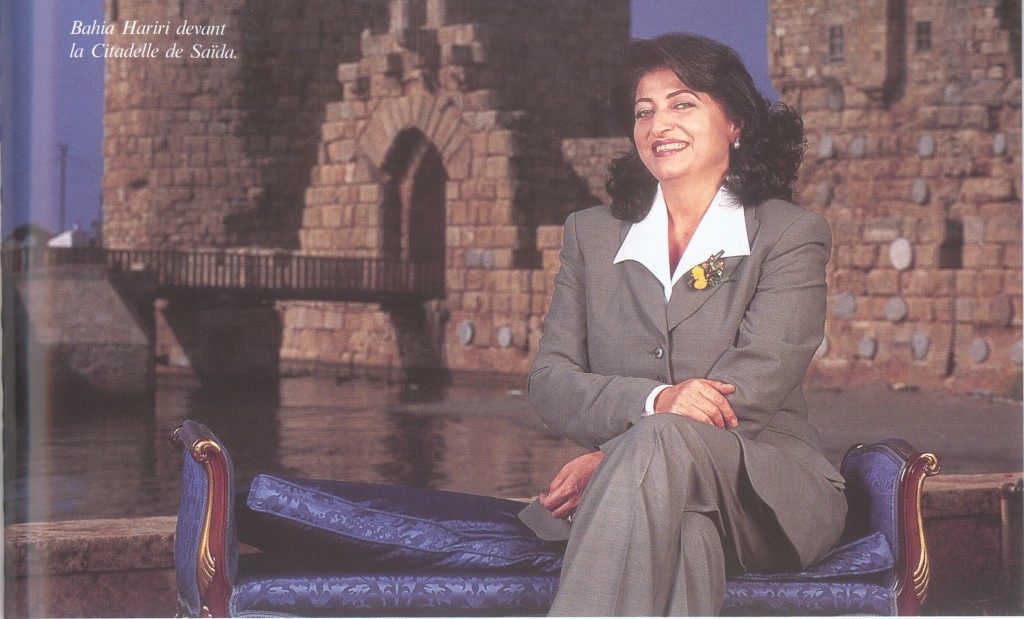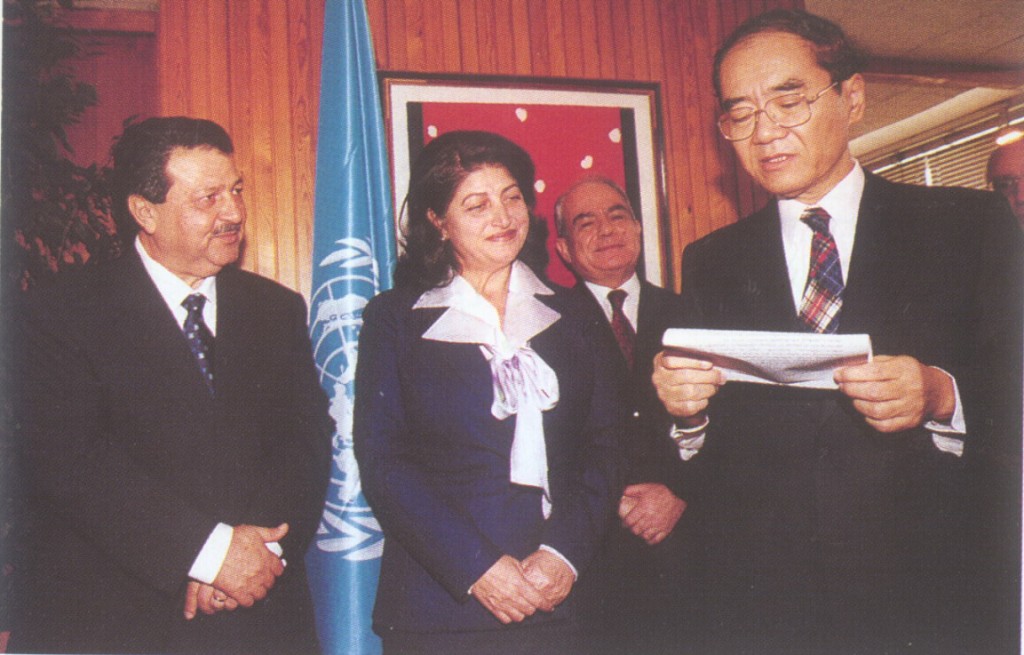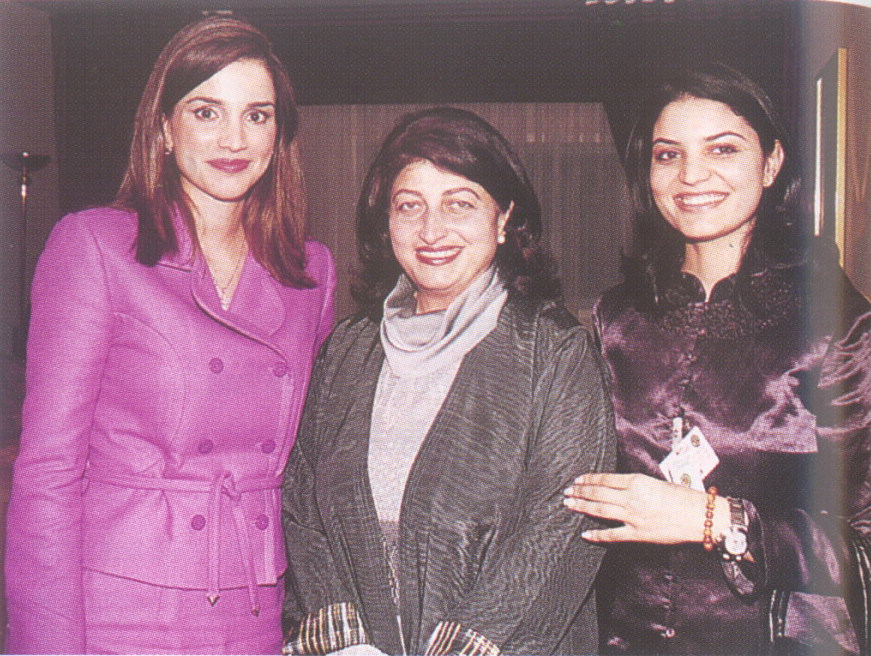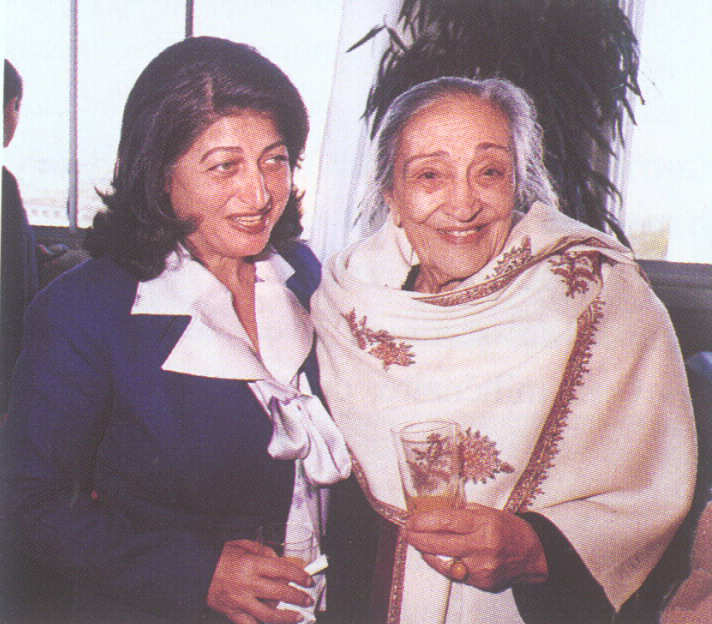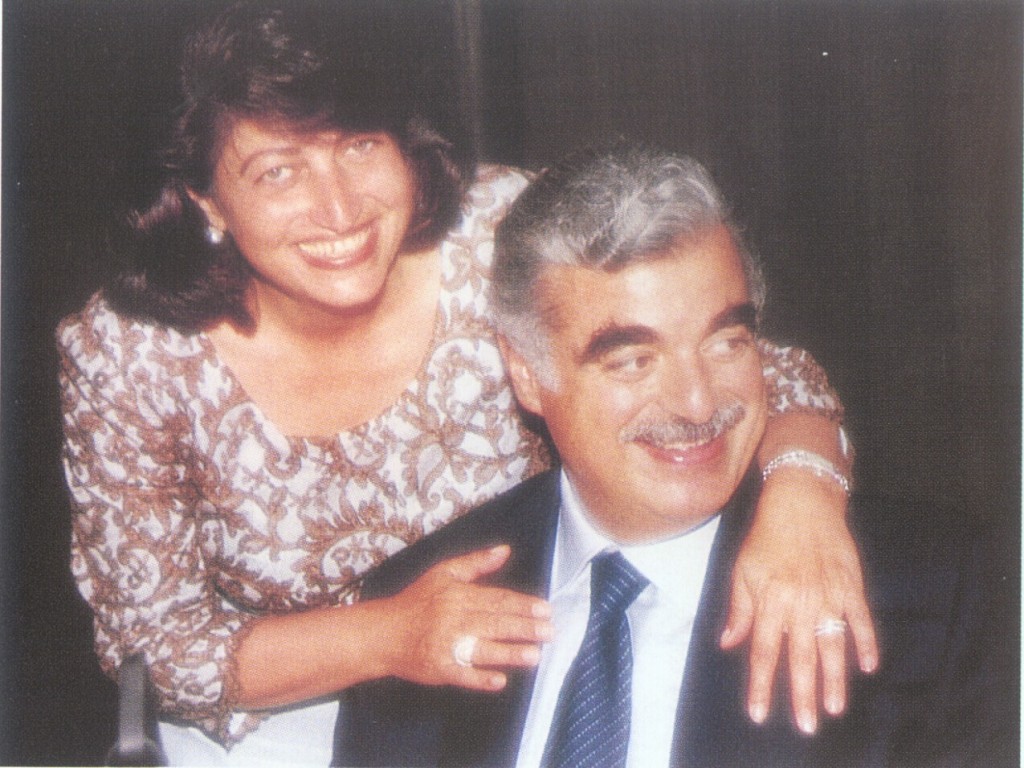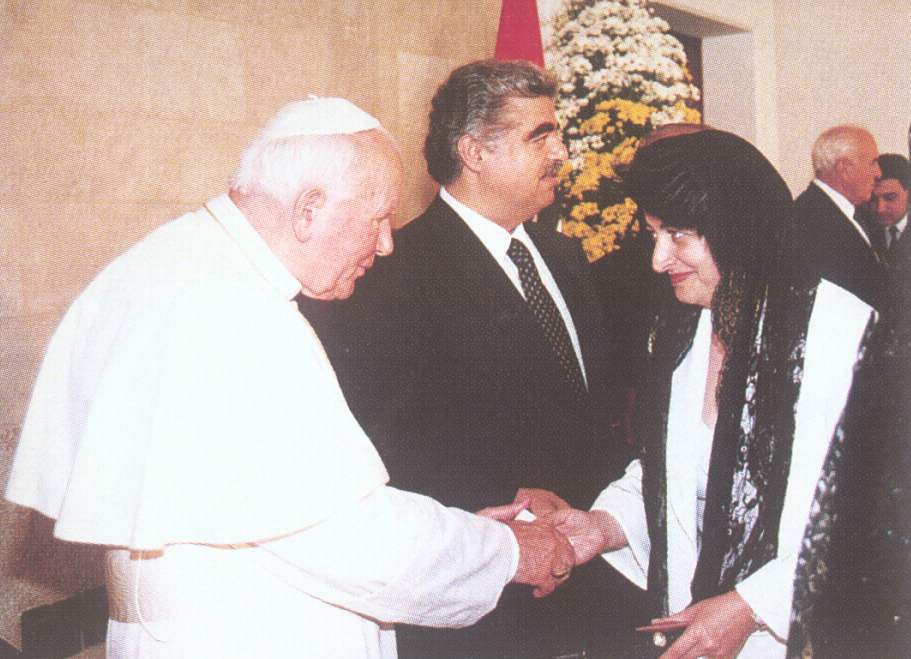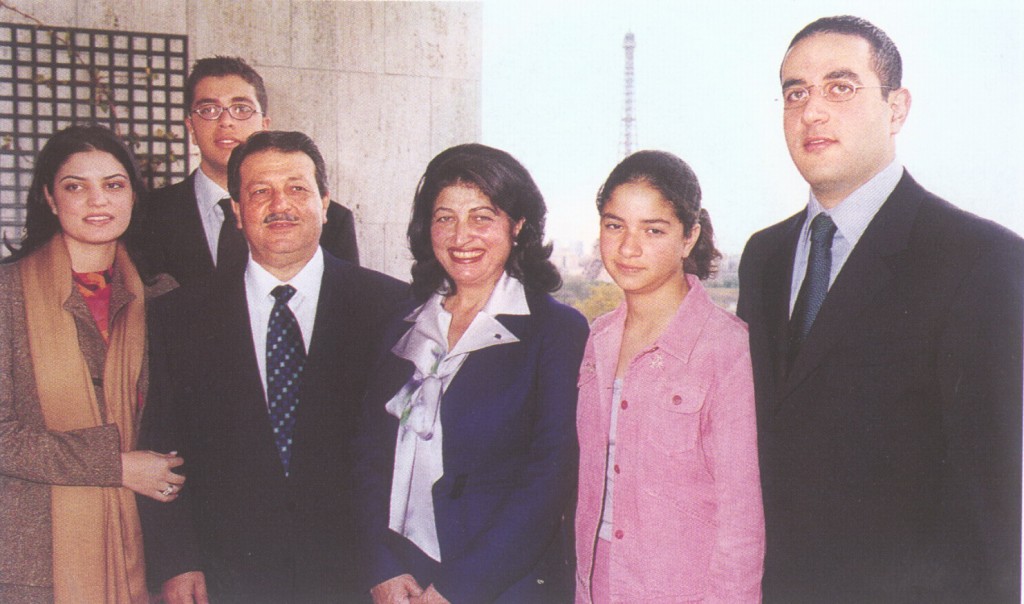Prestige issue 92, January 2001
A BIG HEART SIMPLY…
With a disarming nature, unusual character, authentic, inseparable from the humanitarian scene, working tirelessly in the shadow, like a laborious ant, to the rebirth of culture and preservation of heritage, renowned for her work yet to an exemplary discretion. We met the MP in her beloved city, far from the media spotlights. It is also to Sidon and Lebanon that the Ambassador of Good Will to Unesco dedicates this tribute, recognizing twenty-five years of commitment. Unique appointment that reveals a woman, a mother steeped in emotion.
Bahia Hariri in front of Saida’s citadel. © Prestige
You were appointed on November 17th2000, Goodwill Ambassador by UNESCO at its headquarters in Paris, how did you earn this honorific title granted only for the second time to an Arab woman?
It is to Lebanon and all the Lebanese that this title belongs. The prize is for the community, personal merit comes after. It is true that I maintain a longstanding relationship with Unesco, since I work for twenty-five years in favor of heritage and education. I am in constant contact with the director of Unesco, Mr Koïchiro Matsura, and previously with Mr. Federico Mayor who visited Lebanon twice.
Besides concluding agreements, I participate to all Unesco conferences, I regularly communicate my ideas and projects that mostly are well received and retained. I work also for the promotion and enforcement in Lebanon of Unesco’s programs. The title of Ambassador was suggested because of my commitment to culture and education, and my official contribution to public life in my capacity as MP and especially President of the Parliamentary Committee for Education.
Unesco considered that I represented perfectly the image of the active Arab woman. This title, this platform further formalize my role, by making it even more effective and prompt me to act, to earn more responsibility. Finally, this title is the pride of Lebanon because it is recognition that we are a strong people, tenacious, with persevering effort to reach international status.
On November 17th 2000, during a ceremony at its headquarters in Paris, UNESCO appointed Bahia Hariri Ambassador of Good will. © Archives Bahia Hariri.
Of your projects adopted by Unesco, which is the closest to your heart? Mémoire et Appartenance presented to Unesco which adopted it immediately and circulated worldwide. This project is for young people to become aware of their heritage and regain that sense of belonging to their land. First launched in Sidon, the program implemented six years ago will soon expand to all regions of the country. I realized it was not enough to study and recite civics in schoolbooks.
To enrich their collective memory, young people must realize concrete projects, adopt historical sites. It is undeniable that globalization has invaded our society. If youth does not relate to its heritage, its environment, its customs, the new generation, uprooted, will be a part of the global village. You know, working for culture and heritage is a long process, that cannot be accomplished from the first step. We went through a war that aimed to kill us, destroy our culture, our roots. When I entered into politics, that was my motto: «Help these children born during the war in Lebanon to feel that they belong to this country. For this I launched a series of initiatives, the last was to take the children of freed southern Lebanon to discover Beirut, Baabda, Parliament, Baalbeck … to show them that their country really needs them, they were a part of it. It just was not a simple excursion as some have claimed. This tour, this «excursion» was like a return to the motherland.
You seem to attach particular importance to the emotional memory, you remember the emotions that have marked your own childhood? Memory is not only virtual. To empower the memory, we must relate to something concrete … What is left of childhood? The daily life? No, a color, a smell, a taste, a particular day, a walk which generated an emotion. What remains of my childhood? Some sad times and often joyful moments. Festivals, I remember the place of swings on the side of Khan el Franj. We could find vendors of maallal and pickles with mustard, who had this special taste, this also feeds the memory.
I remember especially the visit to our school, of the President of Senegal, the great poet Léopold Sédar Senghor. And also the traditional family visits, which are very rare today. How then to attach the child to its environment? Basically, through extracurricular programs that restore the relation and edify his memory.
What are the main points of this program? Students in secondary schools are invited to «adopt» a historical or geographical location of Lebanon. During one year, they devote to research, realize statistics, photos and present an exhibition at the end of the year.This program has already been adopted in the schools of South, North, Tripoli and Byblos …
We are confident that it will soon be adopted by the National Association for classified historic sites or about to be filed, that we have founded and inaugurated in the presence of the Minister of Culture.
Did you notice a growing awareness on the part of young people? Yes, last summer, I even entrusted the children with the restoration of remains of historic districts during the summer season. They dusted and cleaned of old stones and they loved it. Similarly, children have improvised guides for visiting delegations in Sidon. Believe me, now they know far much about their heritage, and they are very proud. And do not forget the dynamic Municipal Council for Children, the movement for the revival of folklore. You will often see 600 to 700 children travel by bus from one region to another, to present a popular dance show. Specificity, identity preservation of the memory of the nation, it is our mission which joins the same principles advocated by Unesco. These practical programs put private and public schools on an equal level. They merge the children in the same melting pot that is the heritage. To orphans are offered supplies and uniforms just like the other students, so that poor people do not hold a grudge against society and in the future social peace will be established.
We are considering other projects that will mobilize students: a park, a garden, an artesian well in South – Lebanon. I hope that these projects will extend one day to the whole country and that young immigrants will participate in them or foreigners through twinning. It is important that young people from around the world meet. And I never fail to send Lebanese youth to large gatherings of youth.
You act also and with the same dynamism to improve the status of women in the Arab world. You are the instigator in this regard of the Cairo Summit. Exactly, why did you choose this name «summit» for the first meeting of the Arab Woman in Cairo? A meeting of First Ladies is already by definition a «summit» meeting. Presidents of women’s movements for the most part, they run their own projects, have a certain freedom of action and are close to the government. Their presence at the summit therefore gives it a «legal» connotation, «official», and facilitates the subsequent implementation of recommendations and decisions. Our goal was not only to bring together activists and pioneers but provide them a platform, a launch pad to clear their path to success of their businesses. Media coverage and international record participation: our summit has indeed attracted worldwide attention because it is an unprecedented. It is indeed the first initiative of Women in the Arab world and we should be proud of it.
We do not intend to fall back on ourselves but to expose to the world our own experiences, to cause the event. Usually, these are international organizations that invite us as participants. We never joined together alone without recommendation or guardianship. The Lebanese initiative through the Hariri Foundation brought together for the first time Arab women.
At the Arab Woman summit: with HM Rania of Jordan and Bahia Hariri’s daughter Ghina. ©Archives Bahia Hariri
Bahia Hariri will never forget her old friends … or her teachers, that she honored more than once. This was the case for Angélique Saliba, director of her school, she will invite her to Unesco…
With Angélique Saliba, former Director of the school where the MP received her early education. © Archives Bahia Hariri.
How this summit would make the difference? I wanted this meeting to reflect the reality of facts. There had already been many conferences and their organizers have much merit. They did not, however, lead to much: I was often invited to relate my political experience over these conferences, I’ve realized that this did not lead to anything. We pronounced our word, prepared our things, and then we left each on her side. What was said was soon forgotten.
I realized that from my position, I could make things move. It was essential for me to consider a collective status, unify our cause, to highlight current issues, to «Think» now on an international level.
At the Beijing Summit, the Arab women’s participation was still remarkable … But still, we did not have one unified motion to present from all Arab countries. We’d never done it before. It was necessary to consider the next Beijing summit, establish contacts. We started the preparations. Our summit was held under the official auspices of the Arab League. The host country, the most populated of the Arab world being Egypt, the Egyptian First Lady has been naturally entrusted the chairmanship of the Summit.
Suzanne Mubarak has contributed much to the success of the Summit. Its results have been very satisfactory, and decisions are «founded on the realities of the Arab world.»
Preparation committees are set to work: the Arab League, the Council of Egypt’s people, the Hariri Foundation; and soon the Commission for the Affairs of Women in the Arab Parliamentary Union.
«I owe a lot to my family who directed me, supported me and taught me respect for others».
The result of their efforts will help to create a communication network between states, societies, peoples, pioneers in the Arab world, to ensure links with NGOs to gather and merge all studies, analyzes and statistics related to the Arab woman. It is the committee which also defines the themes of the workshops of the year, small-scale conferences, held around the summit.
How did you manage to achieve your idea in a relatively short time? It was necessary to hold a summit with the beginning of the new millennium to come together to discuss common issues. The idea came to the Conference in Tunisia.
I proposed to the First Ladies including HM Queen Rania, we soon noticed that we share all the same concerns. To open to the world, we should first consult together, overcome obstacles and contradictions, exchange experiences, adopt recommendations to apply them in the respective countries according to the specificities of each, as the most appropriate, irrespective of the ruling regimes. Our concern remains to achieve, to the extent of our ability, to stimulate the civilian population and to experiment that will benefit women, and from there to society.
Information and Woman, a theme you have recently raised…The image of the Arab woman is often distorted by the media, which describe her as illiterate, backward, idle. The information (in particular visual and communication such as the Internet) must intervene to rectify this idea of women. In expanding countries, Brazil, Canada … there are associations of very dynamic women of Arab origin. They were delighted to be invited to the Summit. It was the first time they received a call from an Arab instance.
With Prime Minister Rafic Hariri. © Archives Bahia Hariri
But the condition of the woman is not the same in all Arab countries. Not quite the same, of course.
However, there is much in common between the women of the Arab world. I take as an example those of the Gulf. We consider to be emancipated, whereas modernism is limited to our lifestyle and appearance … Gulf Women work without affecting their customs, get an education, engage in professional life and even founded the Association of Arab businesswomen! It is true that in some countries women have no right to drive, but it’s not the end of the world, she manages to work, she protects her society. These women are also pioneers in a sense, but so little is known of them. The objective of the Summit was also «get to know». Before presenting an image of the Arab woman to the Western society, it was first necessary that we understand her ourselves!
Family photo during a pilgrimage to Mecca. © Archives Bahia Hariri
In concrete terms, how the woman would benefit from the decisions and recommendations of this summit? First, by the program fighting against illiteracy. To believe the statistics, 45 million mothers in the Arab world can not read or write.
In parallel, we are developing a fundamental project to eradicate technological ignorance of the mother, which will allow her to establish a new «dialogue» with her children. And why each country should attempt separately to realize individual projects while it can adopt a prototype plan? It is the importance of the collective effort for a unified, comprehensive, global project. We also plan an increase in productivity of the woman in each country, for her contribution to production does not constitute 18% of the entire population. She may be formed to a trade and increase her productive potential from her home. At present, there is financing of such a project, but it is not effective because it remains restricted.
Following the Summit, you have declared February 1st, the day of Arabic woman, what is the symbolic significance? This Day adopted by the Arab League and the Arab Parliamentary Union will be celebrated every year. This day will also be marked in every arabic nation by various events and competitions, to make rightly a one day-event.
Visit to his holiness the Pope. © Archives Bahia Hariri
You have been very moved when you cited your family in the tribute ceremony of Unesco. My family has done very much for me, my husband and my children have always been on my side, they have always supported me. I could not get through only with my skill, but because my father and my mother accompanied me, raised me according to moral values, principles. My parents instilled me the meaning of life. My brothers, especially Rafik, helped me get into the active life, they strengthened my confidence in me, they gave me responsibilities, supported me, oriented, educated with some rigor. Although I was an only child, I might have been spoiled, enjoy this privileged status, but no, they did not hesitate to entrust me responsibilities, empower me, they taught me respect for others. I was pampered but not spoiled. My brothers and I were friends, I shared my secrets with them. When the Hariri Foundation initiated its activities, my brother Rafik granted me the presidency. The bases were brand new, I was inexperienced, he let me sort out things by myself. It was a great challenge … This support, I will not forget it. Each of the crossed milestones, I do not owe it only to my skills, I am not alone architect of my success, I confess to having enjoyed better conditions than others. So I had to be up to the task that was assigned to me, my mission in parliament or the presidency of the Foundation. At such a moment of my public life, from this platform, I could mention my family and pay tribute to it.
Family portrait: Moustapha, Bahia and their children: Ghina, Ahmed, Ola and Nader. © Archives Bahia Hariri
It was natural that tears run from my eyes. I am very attached to my family. Behind my strong appearance, I have a soft side. The first day of Ramadan, the memory of my parents overwhelms me, I visit the place where they rest. My parents had a lot of compassion for the poors, they loved to look into the hearts in distress. My mother rests next to a nursing home for the elderly. The first day of Ramadan, I joined those old people, I have embraced them, I inquired about their health, I cried too, I effused. Evoking our missing is to make them live forever. These childhood memories give me energy and courage to continue, add more soul to my work. I keep in touch with my family, I try to visit them as often as possible. Even if an adult can stand on his own, in the twilight of his life, he will need the affection of his loved ones.
I can not forget that my parents have«armed» me for life, they were the starting point of my humanitarian career.
Interview by MARCELLE NADIM


